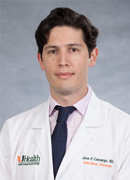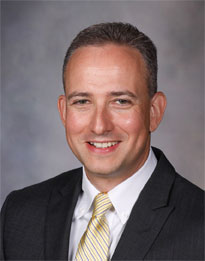
Deadline is here - 24 hours left!
Trainee Tracks Webinar
|
|
NEW DATE Wednesday, February 28, 2018, 11am EST (Montreal time)Topic: Making CME Matter: Innovative Solutions to Maximize the Impact of Medical EducationSpeaker: Alexander S. Niven The goal of continuing medical education (CME) is to speed dissemination and adoption of best practices by physicians and their healthcare teams. Increasing focus on healthcare team performance and growing demands on their time and resources underlines the importance of efficient, effective CME opportunities. This webinar will discuss innovative CME solutions using current education design and active learning strategies, with practical examples using the collaborative experience of volunteer members and staff from the American College of Chest Physicians (CHEST). . |
Symposium in Organ Transplantation in Children
The International Pediatric Transplant Association is proud to feature a special section activity: the 2018 Symposium in Organ Transplantation in Children: An educational forum for physicians, surgeons, and allied health professionals.
The focus of this symposium is aimed at clinical and research fellows in pediatric solid organ transplantation, as well as residents, and other allied health professional or non-physician trainees who are planning a career in pediatric transplantation.
IN THE NEWS
Scientists create functioning kidney tissue
February 9 - Scientists have successfully produced human kidney tissue within a living organism which is able to produce urine, a first for medical science.
International Organ transplantation center to be established in Egypt
February 11 - Ministry of Health and Population will establish the biggest international organ transplantation center in the Middle East at El-Sheikh Zayed Al-Nahyan Hospital, Cairo, according to an official from the Ministry of Health.
USA - DAAs Make Possible Transplant of HCV Positive Organs
February 9 - New research has reported that new DAA drugs may hold the key to making many more organs available to waiting patients.
China - Researchers report first lung stem cell transplantation clinical trial
February 9 - A research team from Tongji University in China have made a breakthrough in human lung regeneration technology. For the first time, researchers have regenerated patients' damaged lungs using autologous lung stem cell transplantation in a pilot clinical trial.
Long-Term Outcomes of Sirolimus in Maintenance Heart Transplant Recipients
February 8 - The authors [of the study] concluded that early conversion to SRL is associated with attenuated CAV progression as well as with lower long-term mortality and CAV-related events compared with continued CNI usage
OneLegacy Announces Opening of California’s First Dedicated Transplant Recovery Center
February 7 - OneLegacy has announced the opening of California’s first dedicated Transplant Recovery Center designed to handle organ, eye and tissue donation and to provide renewed hope to the thousands waiting to receive the gift of life.
Scientists develop a 'third eye' to examine stem cells
February 9 - A joint team of scientists from Russia and the United States designed a method for marking dividing stem cells with three different labels. Until now, it was only possible to use two labels simultaneously. The new method will increase the accuracy and speed of stem cell division analysis and reveal new populations of stem cells.
2nd Opinion Leaders Meeting
on Stem Cell Derived Beta Cells
May 7-8, 2018 | Boston, MA, USA

Workshop topics will include;
- Identifying persistent challenges such as developing beta cells with full physiologic function
- Understanding the potential role of genome engineering to modify cells for therapeutic advantage
- Identifying optimal transplant platforms and encapsulation technologies
- Developing effective approaches to escape allo-, and autoimmunity
- Update on competing technologies including blastocyst complementation and gene edited xenografts
- Presenting recent preclinical and clinical trial results.
Registration is now open, but capacity is limited. Register soon as you won't want to miss this opportunity.
Young Members Corner
Precision medicine in transplantation: the time is here
 Jose F Camargo, MD, University of Miami Miller School of Medicine, Young Members' Committee of The Transplantation Society
Jose F Camargo, MD, University of Miami Miller School of Medicine, Young Members' Committee of The Transplantation Society
Transplantation is a rapidly evolving field of medicine. We live in an era of nanothechnology, gene microarray data, DNA sequencing, proteomics, epigenetic and microbiome. Biomarker-driven strategies are now being implemented in different areas of transplantation including donor matching; prediction of allograft survival and rejection; measurement of the net state of immunosuppression and other transplant outcomes. For example, microRNAs —small non-coding RNA molecules that regulate gene expression— are emerging as novel biomarkers for transplant outcomes including rejection and risk of cytomegalovirus (CMV) infection. High dimensional sequencing of DNA and RNA in donors and recipients offers the potential to improve donor-recipient matching by accounting for minor mismatches in the non-HLA domain. The use of bacteriophages —viruses that infect and replicate on bacteria— is being investigated for the management of resistant bacterial infections in high risk populations such as cystic fibrosis patients.
Women in Transplantation - Call for Contributors
There has been a growing appreciation of the importance of sex and gender in transplantation research. However, good practice guidelines on study design and analysis when handling sex and gender issues in human transplantation research are missing. A scoping review of the literature is currently ongoing to synthesize the evidence on how sex and gender have been considered in human transplantation research to date. This review will help identify gaps and methodological concerns that may restrict the translation of transplantation research into clinical practice because of underestimation of sex/gender differences. The Women in Transplantation Initiative on issues of sex and gender in transplantation is looking to identify TTS members interested in leading a scoping/systematic review on issues of sex and gender in basic transplantation research. An excellent understanding of basic science methodologies is critical. People interested in contributing to this review are also needed. Interested individuals are invited to contact committees@tts.org.
Transplantation Science Awards - Deadline May 31, 2018
The TTS Transplantation Science Committee together and Transplantation are pleased to announce the best manuscripts published by the journal in 2017. Named after two pioneering giants, a selection committee that included editors of Transplantation, The Transplantation Society, in addition to members and chairs of the Transplantation Science Committee will select two winners amongst a very competitive group of publications.
TTS 2018 - Challenging Cases Competition
Deadline: March 18, 2018
Are you involved in managing challenging transplant cases?
If yes, the Scientific Program Committee of the TTS 2018 congress in Madrid is inviting you to submit the most challenging case you were involved with.
The invitation is open to TTS and non-TTS members who are studying/training in any transplant related discipline (students, interns, residents, fellows or post-doctoral fellows). The submitters of the top three ranked cases will be invited to present these cases in a clinical crowdsourcing session at the post-graduate course (PGC) that will precede the TTS 2018 Congress. The winners will receive a complementary registration to the PGC and a Young Investigator Award of US $1000. Description of the case should not exceed 300 words.
CLICK HERE to submit your case!
Contact
Address
The Transplantation Society
International Headquarters
740 Notre-Dame Ouest
Suite 1245
Montréal, QC, H3C 3X6
Canada
Используйте Вавада казино для игры с бонусом — активируйте промокод и начните выигрывать уже сегодня!




